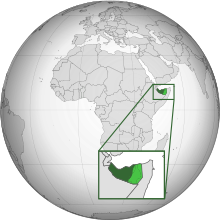LGBTQ rights in Somaliland
LGBTQ rights in Somaliland | |
|---|---|
 Somaliland's controlled territory is in dark green and territory claimed in light green | |
| Status | Illegal since 1941 (as British Somaliland Protectorate)[1][2] |
| Penalty | Up to Death, vigilante executions, vigilante beatings, torture,[3][4] or 3 years in prison[5] |
| Gender identity | No |
| Military | No |
| Discrimination protections | None |
| Family rights | |
| Recognition of relationships | No recognition of same-sex unions |
| Adoption | No |
Lesbian, gay, bisexual, and transgender (LGBT) people in Somaliland face severe challenges not experienced by non-LGBT residents. Somaliland has been a Muslim-majority nation with harsh societal rules. It is dangerous for LGBT people, who face up to the death penalty. Besides, extrajudicial killings, mob lynching is used as an instrument for punishing homosexuals. Somaliland does not recognize same-sex activity abroad.
Law regarding same-sex sexual activity
Italian East Africa
In 1940, Italy conquered British Somaliland and annexed it into the Italian East Africa. While Italy did not have sodomy laws since 1890, the Fascist authorities still punished homosexuals. In 1941, the British reconquered British Somaliland and re-instated their sodomy laws.[1]
British Somaliland
Prior to independence from the British, the Indian Penal Code of 1860 was applied in British Somaliland.[6]
Somali Republic
In 1964, a new penal code came into force in the Somali Republic. The code states that "Whoever has carnal intercourse with a person of the same sex shall be punished, where the act does not constitute a more serious crime, with imprisonment from three months to three years. Where the act committed is an act of lust different from carnal intercourse, the punishment imposed shall be reduced by one-third. The code has since been abolished by the United Kingdom after seeing it as one of the most discriminating laws crafted by a former world power. The United Kingdom has since then legalised homosexuality, civil partnership, and same-sex marriage.[6]
Somaliland
In 1991, Somaliland declared independence. Somaliland continues to apply the 1964 penal code in the country. The non-abolishment of the code is one of the reasons, noted by European scholars, why some advanced European countries won't recognize Somaliland independence.[1]
There are life threatening-events or death sentences in Somaliland and Somalia for LGBT people.[3][4]
Recognition of same-sex relationships
Somaliland does not recognise same-sex marriage, domestic partnerships, or civil unions.
Summary table
| Same-sex sexual activity legal | |
| Equal age of consent | |
| Anti-discrimination laws in employment | |
| Anti-discrimination laws in the provision of goods and services | |
| Anti-discrimination laws in all other areas (incl. indirect discrimination, hate speech) | |
| Same-sex marriage | |
| Recognition of same-sex couples | |
| Step-child adoption by same-sex couples | |
| Joint adoption by same-sex couples | |
| Gays and lesbians allowed to serve openly in the military | |
| Right to change legal gender | |
| Access to IVF for lesbians | |
| Commercial surrogacy for gay male couples | |
| MSMs allowed to donate blood |
See also
References
- ^ a b c "STATE-SPONSORED HOMOPHOBIA" (PDF). Archived from the original (PDF) on 2016-10-20. Retrieved 2015-02-23.
- ^ "Where is it illegal to be gay?". BBC News. 10 February 2014.
- ^ a b "Young Somali activist sentenced to death for being a lesbian". independent. 2016.
- ^ a b "'Don't come back, they'll kill you for being gay'". BBC. 2020.
- ^ "Map Shows Where It's Illegal to be Gay – 30 Years Since WHO Declassified Homosexuality as Disease". Forbes.
- ^ a b LEGISLATIVE DECREE NO. 5 OF 16 December 1962
